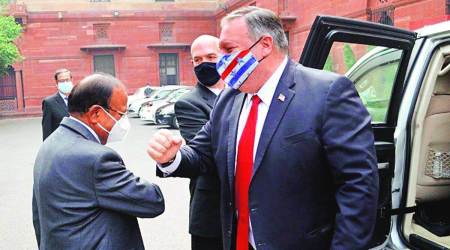The Hindu (29 October 2020) – The India-U.S. Foreign and Defence Ministers meet for the “2+2” mechanism just a week before the U.S. elections is proof that bilateral ties between the two countries are on a firm footing. Ostensibly, the purpose was to conduct an annual review of ties and to wrap up the Basic Exchange and Cooperation Agreement (BECA) for Geo-spatial Cooperation, the last of the three enabling agreements which will facilitate easier interoperability between the Indian and American defence forces. Other agreements signed or reviewed included those in the areas of health and COVID-19 cooperation, building strategic petroleum reserves in the U.S., renewable energy, space, cyberspace, counter-terrorism and counter-narcotics. In the Joint statement they issued, the Ministers also called on Pakistan to take “immediate, sustained and irreversible action” against cross-border terror groups on its soil, and to bring to justice the perpetrators of the 2008 Mumbai attacks, and 2016 Uri and Pathankot strikes. However, the timing and the tenor of the American pronouncements prior to the visit made it clear that the larger import of the visit for the Trump administration was about dealing with China. In every interaction, U.S. Secretary of State Mike Pompeo referred to the challenge from Beijing, of the need to build a counter coalition to the “Chinese Communist Party”, and to further U.S. Indo-Pacific policy in this regard. In India, he made a reference to the “increasing aggression and destabilising activities by China” and mentioned Indian soldiers killed in clashes with the PLA on the LAC in June. He is taking the same message to his next stops. In Colombo and Male on Wednesday — he is also visiting Indonesia — Mr. Pompeo raised the need to counter and provide alternatives to what he called China’s “bad deals, violations of sovereignty and lawlessness on land and sea”.
For New Delhi, the visit by the U.S. officials was a way to demonstrate that the bilateral relationship is “poll-proof” and will grow regardless of the November 3 election result. The BECA agreement signed is an important addition to India’s defence and strategic capabilities, and it is significant that India-U.S. ties have been reaffirmed now given that it could take some months for the U.S. administration to restart bilateral engagements post-elections. While welcoming their U.S. interlocutors and taking ties forward, however, it is significant that the government has chosen not to enter into the comments made by Mr. Pompeo on India’s China challenge, in keeping with New Delhi’s stated policy that the LAC tensions are a “bilateral matter”. The conspicuous silence from External Affairs Minister S. Jaishankar in response to Mr. Pompeo’s comments on China is also a sobering reminder that while India appreciates support from the U.S., it retains its strategic autonomy in dealing with threats and troubles with its biggest neighbour.


